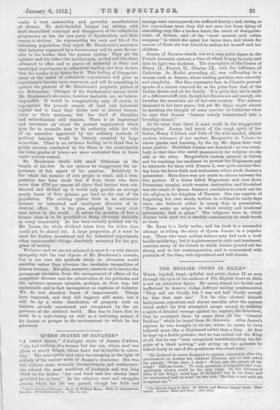QUEEN JEANNE OF NAVARRE.*
"" A GREAT Queen," d'Aubigne wrote of Jeanne d'Albret, • " who had nothing of a woman but her sex, whose soul was riven to manly things, whose heart was invincible to adver- sity." The description may seem too sweeping in the light of al study of the various sides of Joanne's character. She was not without some womanly inconsistencies and weaknesses : :she adored the most worthless of husbands and was long blind to his faults : "her cool bead and her stormy heart ;governed her in turn," In the religious wars and struggles .fonong which her life was passed; though her faith and Qineen Jeanne of Navarre.- ne P. F. William Ryan. With 17 illustrations. London liutchinson and Co. L12s. 6d. net.]
courage were unconquered, she suffered keenly ; and, strong as her convictions were, they did not save her from dying of something very like a broken heart, the result of disappoint- ment, of failure, and of the "most accurst and rotten company" in which she spent her latter days, and which for reasons of State she was forced to endure for herself and her children.
Jeanne of Navarre stands out as a very noble figure in the French sixteenth century, a time of which it may be truly said that its light was darkness. The atmosphere of the Courts of Henry IL, Francis II., Charles IX., with the influence of Catherine de Medici pervading all, was suffocating to a. woman such as Jeanne, whose leading .qualities were sincerity and simplicity. Her fine, expressive face in Clouet's portrait speaks of a. nature removed far as the poles from that of the Italian Queen and all her family. It is plain that she is made of a different stuff, and, though her dreams are sad enough, she breathes the mountain air of her own country. The sadness deepened in her later years ; but yet Mr. Ryan might almost be speaking the thought of some courtier of Catherine when lie says that Jeanne "became utterly transformed into a brooding fanatic."
At the same time there is some truth in the exaggerated description. Jeanne had much of the rough spirit of her father, Henry d'Albret, and little of the wide-minded, almost modern tolerance of her mother, Marguerite de Valois—to whose genius and learnin'g, by the by, Mr. Ryan does very scant justice. Doubtless Jeanne was fanatical : so was every- body in that time who cared passionately for religion on one side or the other. Marguerite's curious interest in Calvin and his teaching, her readiness to protect the Huguenots and to intercede for them with Francis I., was quite another feel- ing from the fierce faith and enthusiasm which made Jeanne a persecutor. Here there was not much to choose between the two parties. If a Guise killed Huguenots and tore down Protestant temples, much wanton destruction and bloodshed was the result of Queen Jeanne's resolution to crush out the old religion in her kingdom of Navarre. She was capable of forgetting her own words, written to a friend in early days when she believed rather in mercy than in persecution. "There exists no religion in which cruelty and irrational inhumanity find a place." The religious wars in which Jeanne took part are a terrible commentary on such words as those.
Mr. Ryan is a lively writer, and his book is a successful attempt at telling the story of Queen Jeanne in a popular way. Those who want serious history may find such a book hardly satisfying ; but it is picturesque in style and treatment, contains mnny of the letters in which Jeanne poured out her strong soul to her contemporaries, and is ornamented with portraits of the time, well reproduced and well chosen.


















































 Previous page
Previous page